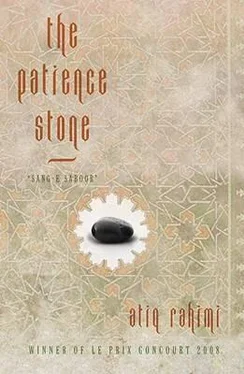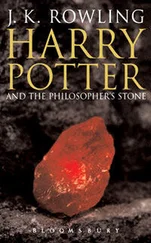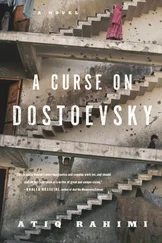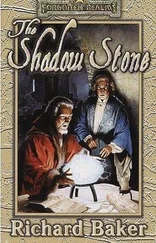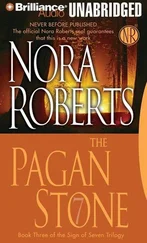She can be heard inspecting the other rooms. She stops when the neighbor’s rasping cough comes near the house. She rushes into the courtyard and calls out to the old woman, “ Bibi … Did someone come here last night?”
“Yes, my daughter, the king came…” She coughs. “He came to visit me… he caressed me…” She laughs, coughing. “Do you have any bread, daughter? I gave all mine to the king… he was hungry. How handsome he was! To die for! He asked me to sing.” She starts singing. “Oh, King of goodness/I weep in loneliness/Oh, King…”
“Where are the others?” the woman asks. “Your husband, your son?” The old lady stops singing and continues her tale in a sad voice. “The king wept, as he listened to me! He even asked my husband and son to dance to my song. They danced. The king asked them to dance the dance of the dead… They didn’t know it…” She smiles, before continuing: “So he taught them, by cutting off their heads and pouring boiling oil on their bodies… Well that made them dance!” She takes up her lament once more. “Oh King, know that my heart can no longer bear your absence/It is time for you to come back…” The woman stops her again. “But what… my God… your house! Your husband, your son… are they alive?” The old lady’s voice becomes shrill, like a child’s. “Yes, they are here, my husband and son are here, in the house…” She coughs. “With their heads under their arms.” She coughs. “Because they are angry with me.” The old woman coughs, and weeps. “They won’t talk to me anymore! Because I gave the king all our bread. Do you want to see them?”
“But…”
“Come on! Talk to them!”
The women walk off across the rubble. They can no longer be heard.
Suddenly, a howl. From the woman. Horrified. Horrifying. Her footsteps stagger over the flagstones, stumble through the ruins, cross the garden, and enter the house. She is still screaming. She vomits. Weeps. Runs around the house. Like a madwoman. “I’m leaving this place. I’m going to find my aunt. Whatever the cost!” Her panicky voice fills the passage, the rooms, the cellar. Then she comes back up, with her children. They flee the house without stopping to check on the man. The sound of them leaving is accompanied by the old woman’s coughing and chanting, which makes the children laugh.
Everything is absorbed into the man’s silence and passivity.
And this continues.
For a long time.
Once in a while, flies’ wings sweep through the silence. At first their flight is decisive, but after a tour of the room they become engrossed in the man’s body. Then leave again.
Occasionally, a gust of wind lifts the curtains. It plays with the migrating birds frozen on the yellow and blue sky studded with holes.
Even a wasp, with its ominous buzzing, is not able to disturb the torpor of the room. It circles the man again and again, lands on his forehead-stings him or not, we shall never know-and flies off toward the ceiling, presumably to build itself a nest amid the rotting beams. Its dreams of nesting come to an abrupt end in the spider’s trap.
It wriggles. And then nothing.
Nothing then.
Night falls.
Shots ring out.
The neighbor returns, with her singing and her lugubrious cough. And immediately goes off again.
The woman does not come back.
Dawn.
The mullah performs his call to prayer.
The weapons are asleep. But the smoke and smell of gunpowder maintain their presence.
It’s when the first rays of sunlight pierce the holes in the yellow and blue sky of the curtains that the woman returns. Alone. She walks straight into the room, straight to her man. First she takes off her veil. Stands there a moment. Looking around, checking everything. Nothing has been moved. Nothing has been taken. The drip bag is empty, that’s all.
Reassured, the woman comes to life. She walks unsteadily to the mattress on which the man is lying, half naked, as she left him the previous night. Stares at him a long time, as if again counting his breaths. She starts to sit down but suddenly freezes, crying “The Koran!” Once more her eyes fill with dread. She searches every inch of the room. No sign of the word of God. “The prayer beads?” She finds them under the pillow. “Has someone been here again?” Again the doubt. Again the fear. “The Koran was here yesterday, wasn’t it?” Unsure, she sinks to the floor. Then suddenly cries, “The feather!” and starts scrabbling around in a frenzy. “My God! The feather!”
From outside comes the sound of children’s voices. Local kids, playing in the rubble.
“ Hajii mor’alé?”
“ Balé?”
“Who wants water? Who wants fire?”
The woman goes over to the window, parts the curtains and calls to the children: “Did you see anyone come into this house?” “No!” they all shout at once, and carry on with their game: “I want fire!”
She leaves the room, inspects the whole house.
Wearily she comes back and leans against the wall between the two windows. “But who is coming here? What do they do to you?” Worry and distress are visible in her eyes. “We can’t stay here!” She falls silent suddenly, as if interrupted. Then, after a brief hesitation, continues: “But what can I do with you? Where can I take you in this state? I think…” Her gaze falls on the empty drip bag. “I’ve got to get water,” she says to give herself time. She stands up, goes out, and comes back with the two glasses of water. Carries out her daily tasks. Sits down. Keeping vigil. Thinking. Which allows her, after a few breaths, to announce almost triumphantly, “I’ve managed to find my aunt. She’s moved to the northern part of the city, to a safer area, to her cousin’s house.” A pause. The habitual pause, waiting for a reaction that doesn’t come. So she continues: “I left the children with her.” Again, she pauses. Then, overwhelmed, mutters, “I’m afraid, here,” as if to justify her decision. Receiving no reaction at all, no word of agreement, she looks down as she lowers her voice. “I’m afraid of you!” She searches the floor for something. Words. But more importantly, courage. She finds them, grabs them, and hurls them at him: “I can’t do anything for you. I think it’s all over!” She falls silent again, then talks quickly, firmly. “It seems this neighborhood is going to be the next front line between the factions.” She adds, furiously, “You knew, didn’t you?” Another pause, just a breath to gather the strength to say, “Your brothers knew, too. That’s why they all left. They’ve abandoned us! The cowards! They didn’t take me with them because you were alive. If…” She swallows her spit, and her rage as well. Continues, less fiercely, “If… if you had died, things would have been different…” She interrupts that thought. Hesitates. After a deep breath, decides: “One of them would have had to marry me!” Her voice shakes with a silent snigger. “Perhaps they would have been happier if you had died.” She shudders. “That way, they could have… fucked me! With a clear conscience.” Having said it, she stands up suddenly and leaves the room. Paces nervously up and down the passage. Searching for something. Calm. Serenity. But returns more febrile still. She rushes at the man and gabbles it all out in a rush: “Your brothers have always wanted to fuck me! They…” Walks away, and back again. “They spied on me… constantly, for the whole three years you were away… spied on me through the little window in the bathhouse while I was washing myself… and… jerked off. They spied on us too, at night…” Her lips tremble. Her hands move feverishly through the air, through her hair, through the folds of her dress. Her footsteps stumble on the faded stripes of the old kilim. “They jerk…” She breaks off, and again storms furiously out of the room, for a breath of fresh air and to purge herself of her rage. “The fuckers!” she yells in exasperation. “The bastards!” And can immediately be heard weeping and begging: “What am I saying? Why am I saying all this? Help me, God! I can’t control myself. I don’t know what I’m saying…”
Читать дальше
